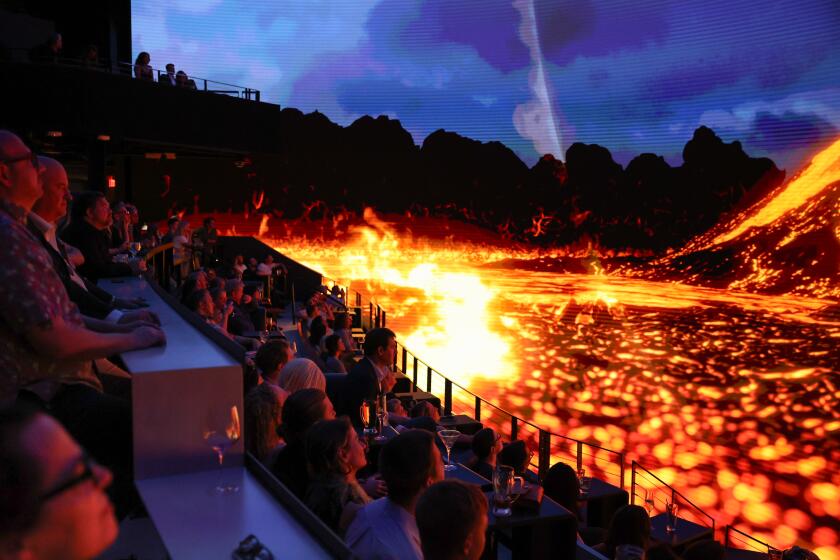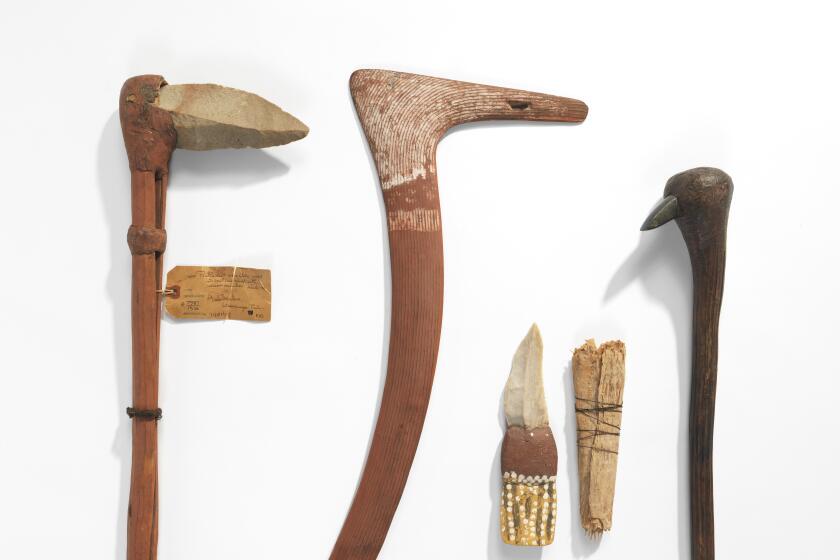Cornerstone puts the immigration issue center stage
WHILE the president and Congress were struggling to reach a consensus on what to do about illegal immigration, the ensemble at Los Angeles’ Cornerstone Theater had already agreed to address the issue with its next play, “Los Illegals,” written by the theater’s new artistic director, Michael John Garces .
Opening June 7 at the Armory Northwest in Pasadena, “Los Illegals” will be the first play in a new Cornerstone cycle organized around the theme of justice and “how laws shape and disrupt community,” in the theater’s description. Subsequent productions will cover reproductive rights, incarceration and the environment.
Like all Cornerstone works, “Los Illegals” is the result of a playwright and director researching a subject with people from the community under scrutiny, then casting some of those people in a production with professional actors. Such community-based drama has been the special province of Cornerstone, a national theater company based in Los Angeles since 1992.
The community in question in “Los Illegals” is the hordes of day laborers who congregate in parking lots at Home Depot stores and on street corners hoping to get temporary work, much of it in construction and landscaping. Most, but not all, of these workers are undocumented Latino immigrants, and their true stories have provided Garces with the inspiration for “Los Illegals.” Under the direction of longtime company member Shishir Kurup, the play will be performed in an equal mixture of English and Spanish, reflecting the bilingual inmigrante subculture.
Cornerstone is familiar with the challenge of initiating ordinary people into the rigors of the stage, but “Los Illegals” brings another challenge: that of incorporating workers into the ensemble who might be facing legal jeopardy. While the show was being cast, fresh Immigration and Customs Enforcement raids in San Diego were making news. “We thought about having people wear masks,” says Kurup. “We didn’t ask anybody about their status.”
And although there is always the danger of attrition with amateurs who don’t realize at first how hard theater can be, Kurup says, “people here have felt the great need to tell this story, and so they have come and been willing to work.”
The bilingual approach
GARCeS, the son of a Cuban father and Minnesotan mother, grew up in Colombia and attended the University of Miami, but he says that calculating the blend of English and Spanish proved to be a new kind of math for him as a playwright, even while he saw it as a necessary strategy given the subject at hand.
“Most undocumented workers do not speak English,” Garces says. There are some stretches of Spanish in the play where people who don’t speak Spanish may be somewhat befuddled, “but I think that reflects a certain reality of Los Angeles. And then there are clearly stretches of English where the monolingual Spanish speakers will wonder what’s going on and will have to glean it from the action.”
Getting plot points across in both languages is essential, he says. “We’re still struggling with it; that’s what’s exciting about this play.”
Cornerstone has done its share of multilingual theater in the past, but “Los Illegals” will be its first thoroughly bilingual play.
“There’s not a lot of truly bilingual theater going on,” says Garces, who has directed plays in Spanish as well as English and been a director at INTAR, the long-running Latino theater in New York. “We’ll learn about the viability of a truly bilingual experience.”
Garces came to Cornerstone from New York last year after 15 years working as a freelance director at major American nonprofit theaters like the Hartford Stage Company, Yale Repertory and the Humana Festival but also after spending time with a consensus-based collective theater group in Chiapas, Mexico, staging similar community-based plays using farmers and other residents. Last year, he was initiated in the Cornerstone method by its founder, Bill Rauch, when Rauch invited him to co-direct a play about the history of a local neighborhood at the Guthrie Theater in Minneapolis. (Rauch, who co-founded Cornerstone with Alison Carey in 1986, departed to run the Oregon Shakespeare Festival in Ashland.)
Unlike the traditional hierarchy at not-for-profit theaters, where the artistic director chooses the plays, at Cornerstone the 15 permanent ensemble members discuss ideas and possibilities, achieving consensus before moving ahead with the next show.
In Garces’ first discussions with the company, “a lot of things seemed to be on the table and in flux -- immigration, reproductive rights,” he says. The meetings led to a slight change in approach. “For the first time we’re looking at community through the prism of issues as opposed to looking at issues through the prism of community. It’s a little different, deciding what we want to grapple with and then finding communities that are at the front lines of this issue.”
Cornerstone’s last major project, the Faith-Based Theater Cycle, examined the diversity and divisiveness of religions in Los Angeles and culminated in James Still’s “A Long Bridge Over Deep Waters,” with 57 actors, staged in June 2005 at the Ford Amphitheatre.
For “Los Illegals,” Garces and Kurup contacted the National Day Laborer Organizing Network to help introduce them to workers. They went to street corners to meet the indocumentados and invited some of them to continue the conversation in more elaborate interviews. Some were then invited to auditions.
“I learned a tremendous amount about the world that I didn’t know,” says the 40-year-old playwright. Among other things, Garces was struck by “the diversity of the community” and the number of countries represented. While some were illiterate, others were highly educated. “In New York, I met Russian doctors who were driving cabs; I don’t know why I thought this would be different.”
He also spoke to a federal immigration judge and a number of lawyers. He tried to speak to the anti-illegal immigrant California group Save Our State to get a different point of view but in the end was able to engage members only amid the noise and distraction of a protest rally.
“We focused on the day laborers themselves. We found some really interesting tensions in that community -- between the workers who are in the organized sites versus those who don’t want to join the organized sites -- how they perceive each other.
“There is tension between the day-laborer community and the activists against them, but the actual tension of the play is about the uneasy relationship between the undocumented workers and their employers and among the workers themselves.”
Some of the workers see the play as a mirror of their lives. “This is exactly what happens on the street corners,” Hector Perez, a 40-year-old hotel worker from Mexico City, says in Spanish during a rehearsal while actors shout at one another on an outdoor stage in Pasadena. “Sometimes we fight when there are not enough jobs for everyone.”
Perez, who last acted in high school in Mexico City, auditioned for the play after his brother brought home a flier from the Home Depot in Hollywood. He has not seen his wife and two sons since he came north five years ago.
“It’s what we live every day,” says Rafael Molina, 54, a construction worker from El Salvador whose experiences during his 10 years in Los Angeles are among those Garces used to inform his script. “There are too many laborers. We all fall.”
Molina has not decided if he is going to go onstage himself. He changes his mind from day to day and says it depends on whether he is going to leave town in the next month to find work in New York.
Garces stresses that “Los Illegals,” like other Cornerstone projects, is not to be confused with documentary theater that reconstructs real events. Nor is it a work written by committee. The author of the plays “Acts of Mercy” and “points of departure,” Garces has taken his research and created a work of fiction, loosely basing it on the 17th century Spanish classic “Fuente Ovejuna” by Lope de Vega, about a group of villagers who kill an oppressive military officer and stand united under prosecution for the crime.
Activism and artistry
GARCeS prefers to invoke the model of Clifford Odets writing the stirring pro-union drama “Waiting for Lefty” for the Group Theater in the 1930s.
“It’s not consensus-based art making,” Garces says. “Once we consent to work with a playwright and director, the ensemble does not micromanage the creation of the work. We value idiosyncratic artists with idiosyncratic visions.
“Some of my work has been congruent with an activist goal. But I’m not an activist; I’m an artist. And I think everybody in the ensemble is. We’re a collective of artists, not a collective of social workers.”
Still, one of the theater’s goals is to fill the audience with members of the community whose story is being told. “It’s hugely important,” says Garces, that day laborers and their families come to see “Los Illegals” along with the regular theatergoing public. To encourage this, the box office maintains a “pay what you can” policy during the four-week run.
As for working with amateurs after years of directing and writing for big-time professional theaters, Garces says, “At its best, the professionals elevate the people around them by example. And what the nonpros can bring to the table is a kind of unpolished visceral connection to the material and to the sense of place and time that forces the actors to let go of some of their tricks and get real.”
*
(BEGIN TEXT OF INFOBOX)
Cornerstone’s Justice Cycle
“Reproductive Rights”
Written by Julie Marie Myatt
Directed by Michael John Garces
November
Topic: Issues of “choice”
“Eye for Eye”
Written by KJ Sanchez
Directed by Laurie Woolery
June 2008
Topic: Prison and incarceration
“Environmental Justice”
Directed by Juliette Carrillo
November 2008
Topic: Access to sky, water and land
“Bridge Show”
Written by Naomi Iizuka
June 2009
Topic: The Justice Cycle communities join for a culminating play
--
‘Los Illegals’
Where: Cornerstone Theater at Armory Northwest, 965 N. Fair Oaks Ave., Pasadena
When: Opens June 7. 8 p.m. Thursdays through Sundays
Ends: June 24
Price: Pay what you can, $20 suggested donation
Contact: (213) 613-1700, Ext. 33
More to Read
The biggest entertainment stories
Get our big stories about Hollywood, film, television, music, arts, culture and more right in your inbox as soon as they publish.
You may occasionally receive promotional content from the Los Angeles Times.






